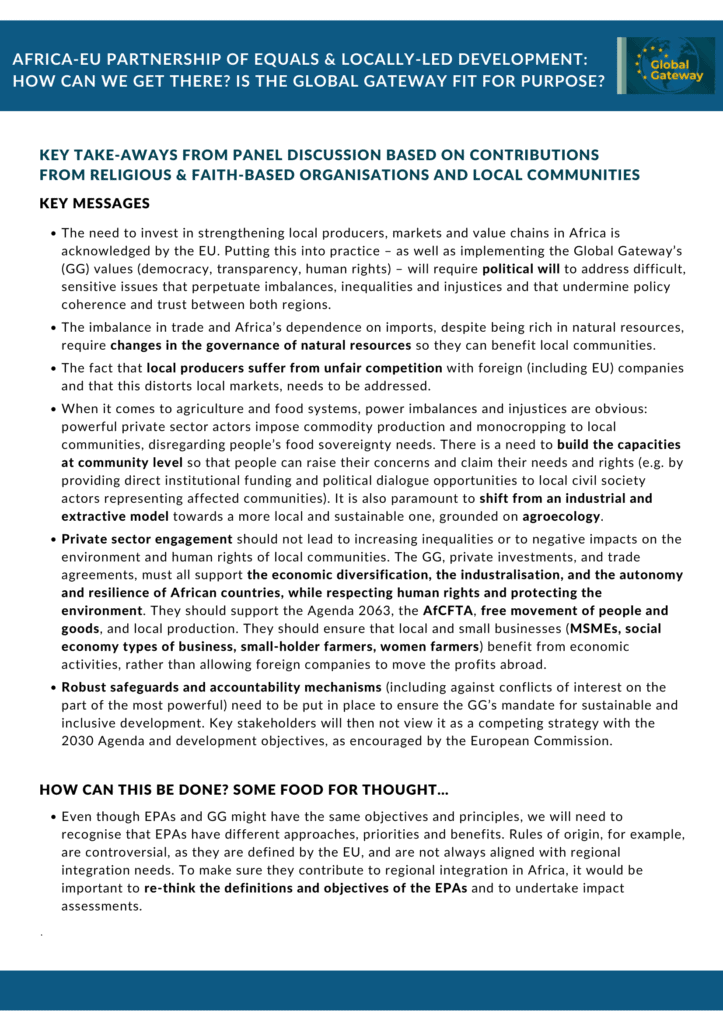Together with other faith-based organisations, ACT Alliance EU organised a panel discussion on how to create an Africa-EU partnership of equals. The discussion was hosted by MEPs Bricmont (B, Greens) and Zorrinho (P, S&D) on 7 March 2023. The objective was to discuss the Global Gateway’s strategy through the lens of African FBOs and local communities.
Key messages
- The need to invest in strengthening local producers, markets, and value chains in Africa is acknowledged by the EU. Putting this into practice – as well as implementing the Global Gateway’s (GG) values (democracy, transparency, human rights) – will require political will to address difficult, sensitive issues that perpetuate imbalances, inequalities, and injustices and that undermine policy coherence and trust between both regions.
- The imbalance in trade and Africa’s dependence on imports, despite being rich in natural resources, require changes in the governance of natural resources so they can benefit local communities.
- The fact that local producers suffer from unfair competition with foreign (including EU) companies and that this distorts local markets needs to be addressed.
- When it comes to agriculture and food systems, power imbalances and injustices are obvious: powerful private sector actors impose commodity production and monocropping on local communities, disregarding people’s food sovereignty needs. There is a need to build capacities at the community level so that people can raise their concerns and claim their needs and rights (e.g., by providing direct institutional funding and political dialogue opportunities to local civil society actors representing affected communities). It is also paramount to shift from an industrial and extractive model towards a more local and sustainable one, grounded on agroecology.
- Private sector engagement should not lead to increasing inequalities or to negative impacts on the environment and human rights of local communities. The GG, private investments, and trade agreements must all support the economic diversification, industrialisation, autonomy and resilience of African countries while respecting human rights and protecting the environment. They should support the Agenda 2063, the African Continental Free Trade Area (AfCFTA), free movement of people and goods, and local production. They should ensure that local and small businesses (Micro, Small, and Medium-sized Enterprises, social economy types of business, small-holder farmers, and women farmers) benefit from economic activities, rather than allowing foreign companies to move the profits abroad.
- Robust safeguards and accountability mechanisms (including against conflicts of interest on the part of the most powerful) need to be put in place to ensure the Global Gateway’s mandate for sustainable and inclusive development. Key stakeholders will then not view it as a competing strategy with the 2030 Agenda and development objectives, as encouraged by the European Commission.
How to achieve an Africa-EU Partnership of Equals
- Even though Economic Partnership Agreements (EPAs) and Global Gateway might have the same objectives and principles, we will need to recognise that EPAs have different approaches, priorities, and benefits. Rules of origin, for example, are controversial, as they are defined by the EU, and are not always aligned with regional integration needs. To make sure they contribute to regional integration in Africa, it would be important to re-think the definitions and objectives of the EPAs and to undertake impact assessments.
- “Walk the talk” – in close dialogue with African stakeholders and civil society, select investments that are sustainable for people, the environment, and economies, and benefit primarily local communities and markets in Africa; facilitate free movements of people and goods within Africa and between Africa and Europe, in mutual terms.
- Subject the GG to greater transparency and accountability by implementing the proposal to create a CSO dialogue platform in the Global Gateway’s governance, as endorsed by Commissioner Urpilainen. Reconsider the approach: recognise the limitations of the neoliberal capitalist model, which have become more apparent. Encourage a shift in philosophy that focuses on addressing structural issues, promoting justice, and building trust, to create a more equitable society.
“If you come to Uganda, we have a lot of NGOs operating in small villages here, hundreds of them from all over the world. But why is it that, until today, the situation hasn’t improved much? What is the real problem?” – Masaidio Kalenga, Kimanya-Ngeyo Foundation for Science and Education (Uganda)
“This model has in some ways brought humanity forward, but it also has many limitations. Where is there room to have deeper conversations and to think seriously about whether we are replicating things that simply don’t work for anyone, especially not for some regions of the world?” – Rachel Bayani, Baha’i International Community
Speakers/panelists included:
- MEPs Saskia Bricmont (Greens) and Carlos Zorrinho (S&D)
- Chiara Adamo, Acting Director at DG INTPA G and Head of Unit G1 (Governance, Democracy, Gender Equality, Human Rights)
- Ivano Casella, Trade Affairs Officer at DG TRADE Unit C1 (African, Caribbean and Pacific, Overseas Countries and Territories)
- Claire Améyo Quenum, Alliance for Food Sovereignty in Africa (AFSA) (Togo)
- Lucy Esipila, Caritas Africa Advocacy Officer (Kenya)
- Masaidio Kalenga, Kimanya-Ngeyo Foundation for Science and Education (Uganda)
- Floris Faber, ACT Alliance EU Representative and Head of Office
- Fr. Manuel Barrios Prieto, General Secretary of COMECE
The panel discussion took place on 7 March 2023, at the European Parliament and online. It was co-hosted by MEPs Saskia Bricmont and Carlos Zorrinho and organised by ACT Alliance EU, AEFJN, Baha’i International Community, Caritas Europa, CIDSE, COMECE, Don Bosco International, EU-CORD, World Vision EUREP.
